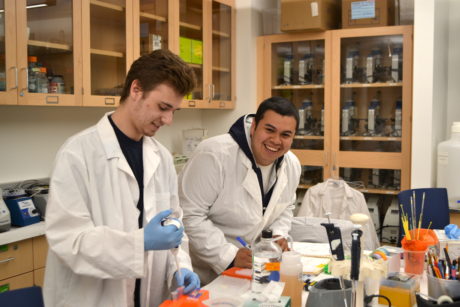
At Drexel University:
Bio 132H- Honor’s Genetics and Evolution
An introductory course for biology majors. Students will learn about evolution, genetic inheritance (including Mendelian and non-Mendelian patterns of inheritance), and the mechanisms of how populations and species change over time, highlighting key evolutionary events. We will also explore the development of individual organisms, connecting developmental processes with evolutionary trends. This course has a lecture and recitation component.
An introductory course for biology majors. Students will learn about evolution, genetic inheritance (including Mendelian and non-Mendelian patterns of inheritance), and the mechanisms of how populations and species change over time, highlighting key evolutionary events. We will also explore the development of individual organisms, connecting developmental processes with evolutionary trends. This course has a lecture and recitation component.
At Monmouth University:
BY 109 – Introductory to Biodiversity and Evolution.
An introductory course for biology majors. Focus is on evolution, phylogeny, taxonomy, origin and diversity of life, physiology of plant and animal systems, and ecological principles. Three hours of lecture and two hours of laboratory per week. Limited to students who are majors in Biology, Chemistry, Mathematics, Computer Science and Software Engineering.
An introductory course for biology majors. Focus is on evolution, phylogeny, taxonomy, origin and diversity of life, physiology of plant and animal systems, and ecological principles. Three hours of lecture and two hours of laboratory per week. Limited to students who are majors in Biology, Chemistry, Mathematics, Computer Science and Software Engineering.
BY 110 – Introduction to Cell and Molecular Biology
For biology majors and other students needing an introduction to the cellular and molecular levels of biology. Includes an introduction to cell structure and function, biochemistry and metabolism, bioenergetics, genetics and cell division, and molecular biology. Three hours of lecture and two hours of laboratory per week. Limited to majors in Biology, Chemistry, Clinical Science, Medical Laboratory Science, Mathematics, Computer Science, Software Engineering, Criminal Justice, Health Studies, and Health and Physical Education.
For biology majors and other students needing an introduction to the cellular and molecular levels of biology. Includes an introduction to cell structure and function, biochemistry and metabolism, bioenergetics, genetics and cell division, and molecular biology. Three hours of lecture and two hours of laboratory per week. Limited to majors in Biology, Chemistry, Clinical Science, Medical Laboratory Science, Mathematics, Computer Science, Software Engineering, Criminal Justice, Health Studies, and Health and Physical Education.
BY216- Genetics
Focuses on one of the core concepts of biology; the flow, exchange, and storage of hereditary information. Topics will include principles of classical and molecular genetics, including transmission, arrangement, and alteration of genetic information; structure, function, and regulation of the genetic material; biological variation resulting from recombination, mutation, and population genetics; applications to human heredity. Two 80-minute lectures and one 3-hour lab per week.
Focuses on one of the core concepts of biology; the flow, exchange, and storage of hereditary information. Topics will include principles of classical and molecular genetics, including transmission, arrangement, and alteration of genetic information; structure, function, and regulation of the genetic material; biological variation resulting from recombination, mutation, and population genetics; applications to human heredity. Two 80-minute lectures and one 3-hour lab per week.
BY398- Special Topics: Urban Evolution
Students will learn fundamental principles of evolution and gain skills in searching for, reading, and evaluating relevant primary research with a focus on urban evolution. Participants will synthesize findings by writing for both scientific and lay audiences and proposing new research to move the field forward. Prerequisites: BY-109 and BY-216.
Students will learn fundamental principles of evolution and gain skills in searching for, reading, and evaluating relevant primary research with a focus on urban evolution. Participants will synthesize findings by writing for both scientific and lay audiences and proposing new research to move the field forward. Prerequisites: BY-109 and BY-216.
BY495- Senior Seminar
A seminar course with presentations by guest scientists as well as students. Gauges students’ abilities to draw upon a broad background of coursework and experience to organize, present, discuss, and evaluate topics of current interest in biology. Prerequisite: Senior standing; open only to Biology majors.
A seminar course with presentations by guest scientists as well as students. Gauges students’ abilities to draw upon a broad background of coursework and experience to organize, present, discuss, and evaluate topics of current interest in biology. Prerequisite: Senior standing; open only to Biology majors.
BY424- Evolution
Synthetic theory of evolution, including sources of genetic variability, Hardy-Weinberg, natural selection, genetic drift, balanced polymorphism, molecular evolution, speciation and the origin of life. Three hours of class per week. Prerequisites: BY-109 and BY-110, both passed with a grade of C- or higher.
Synthetic theory of evolution, including sources of genetic variability, Hardy-Weinberg, natural selection, genetic drift, balanced polymorphism, molecular evolution, speciation and the origin of life. Three hours of class per week. Prerequisites: BY-109 and BY-110, both passed with a grade of C- or higher.